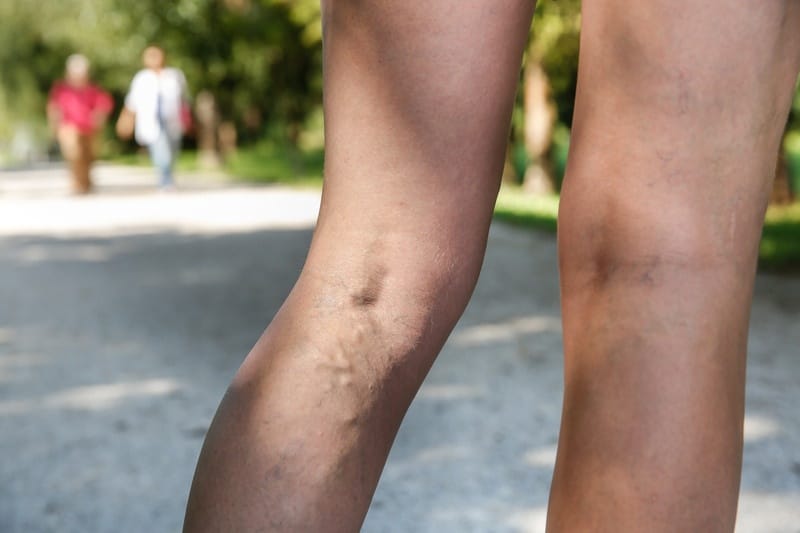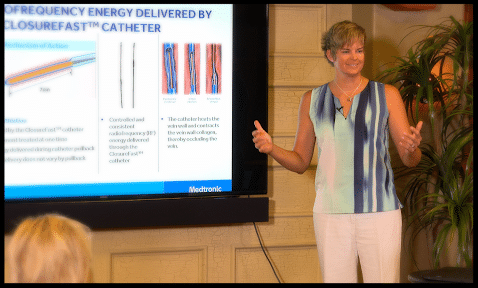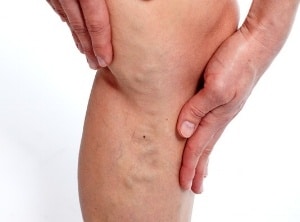Can Varicose Vein Pain be Eliminated?
Can Varicose Vein Pain be Eliminated?
It is the end of a long day, and suddenly you realize that the varicose veins that you barely considered this morning are working hard to get your attention. They ache, and your legs feel heavy and are getting swollen. Especially if you have been ignoring them all day, it is important to give your legs some attention, both for your immediate comfort and for your long-term health.
Much of varicose vein pain is caused by the pressure exerted by distended veins on the surrounding tissue. This pressure can be exacerbated by inflammatory agents your body releases in response to this injury.
Your Best Option for Minimizing Varicose Vein Pain
If you are experiencing pain associated with your varicose veins, you may need the help of a qualified vein specialist to determine whether your vascular health is at risk. After an examination, they may be able to recommend a minimally invasive procedure that will ease your discomfort, or even eliminate your pain.
Arizona Vein Specialists
In the meantime, there are some simple short-term solutions for varicose vein discomfort. They take a little time and effort, but they can be worth it.
Varicose Veins Home Treatment
The first thing to do is take a load off, elevate your legs. Lifting your feet, so they are level or slightly elevated above your heart helps to move out blood that has been pooling all day. It also takes some strain off your heart.
After that, do everything you can to keep things moving. Staying active will help to prevent pooling blood from exerting painful pressure on your muscles and skin, and will help minimize the collection of metabolic waste products collecting in distended areas.
- Avoid sitting or standing for long periods. As much as possible, move around throughout the day.
- Avoid tight clothing and don’t cross your legs when sitting.
- Compression stockings that are prescribed by a vein specialist may offer some relief, and further, improve venous return as you go about your activities.
- Alternating warm and cool compresses on the area can help to move the excess fluid that has become lodged in the tissue of the lower limbs and is exacerbating your pain.
Take care of the inflammation
Histamines and other inflammatory agents that your body releases in response to the trauma of varicose veins can increase your pain. While oral medications are not typically prescribed for varicose veins, some doctors recommend anti-inflammatories such as ibuprofen to deal with discomfort. However, these medications can take their toll on the stomach, as well as the liver and kidneys.
Some experts suggest naturopathic pain relievers, such as Horse Chestnut, Arnica Montana, and white willow bark for their anti-inflammatory and blood vessel dilating properties. Before you try them, ensure that these substances do not interact with any other medications you may be taking.
Consider your diet
Eating a balanced diet is essential for health and healing, and, as such, can help to minimize varicose vein discomfort. On the other hand, eating a diet high in inflammation-causing foods, such as sugar, trans fats, and allergens, can have the opposite effect, increasing pain levels and other symptoms.
Watch out for signs that your varicose veins are getting worse. If your varicose vein pain suddenly becomes intense or is accompanied by localized redness, swelling and heat, please seek medical attention immediately. These could be signs of Deep Vein Thrombosis.
Varicose Vein Pain Next Steps
Keep in mind that if you are experiencing pain or other symptoms associated with varicose veins, and homeopathic treatments don’t provide relief, you may be one of 30 million American men and women who are affected by Venous Reflux Disease, or Chronic Venous Insufficiency (CVI).
Consider getting a complete venous evaluation and possible treatment from a qualified vein specialist to defend against varicose vein pain and ensure your long-term vascular health.
Is there anything worse than itchy varicose veins? Maybe, but itchy veins remains high on the list of issues we would love to resolve before they drive us crazy. If you are experiencing itching around your varicose veins, it could be a message from your body that it is time to have your veins checked…
Read MoreThe full story on Chronic Venous Insufficiency, what it is and how to treat it. A video presentation by Jilanne Rose, DNP-C, Clinical Director. Run Time 24:46. TRANSCRIPT What’s the Difference Between Veins and Arteries? When we talk about vascular health and vascular disease most people think about arteries. When we talk about the…
Read MoreA group of Gilbert Arizona Residents concerned about Chronic Venous Insufficiency gathered on Saturday July 16th for an interactive discussion on CVI symptoms, causes and treatments. Chronic Venous Insufficiency, Venous Reflux Disease and Varicose Veins affect over 30 million American men and women. Unfortunately, many do not get treated as they believe varicose veins are…
Read MoreCan Chronic Venous Insufficiency (CVI) be reversed? Unfortunately the short answer to this question is no; but CVI can be treated with minimally invasive procedures which can reduce symptoms and improve quality of life tremendously! Chronic Vein Insufficiency Causes In order to understand why venous insufficiency or peripheral venous insufficiency cannot be reversed, we must…
Read MoreWhat can you do to treat bleeding varicose vein and spider veins? First and foremost, don’t panic. Although the visual effect of a ruptured varicose vein or bleeding vein can be alarming, there are some simple things that can be done to get the bleeding to stop. If you can reach the area that is…
Read MoreWhy are varicose veins painful? The discomfort associated with varicose veins is caused by a combination of factors. When veins are weak, the blood which is supposed to return to the heart in a timely fashion, settles and pools in the superficial vein system. This pooling of blood worsens when patients stand or sit in…
Read MoreEndovenous Ablation Definition Taken literally, endovenous ablation is the removal of a vein from within. ‘Endo’ means internal or inside, ‘venous’ refers to a vein, and ablation is to ‘remove’. In the instance of veins, it is no longer necessary to physically remove a vein from the leg (vein stripping) to improve symptoms or the…
Read MoreThe newest procedure for the treatment of varicose veins was approved by the FDA about two years ago. It is what has been termed a non-tumescent non-thermal therapy. What this means is that it does not require a lot of numbing medicine to complete, and it does not use a heating element to close or…
Read MoreWhat is the best treatment for varicose veins? No varicose vein is the same; no person’s symptoms are the same; and so the best procedure for varicose veins is not always the same. The treatments associated with vein disease are based on a patient’s symptoms, vein size, location, contributing conditions, and ultrasound findings. Different…
Read More


